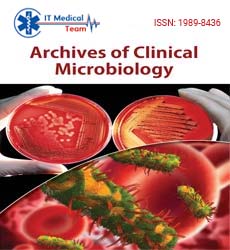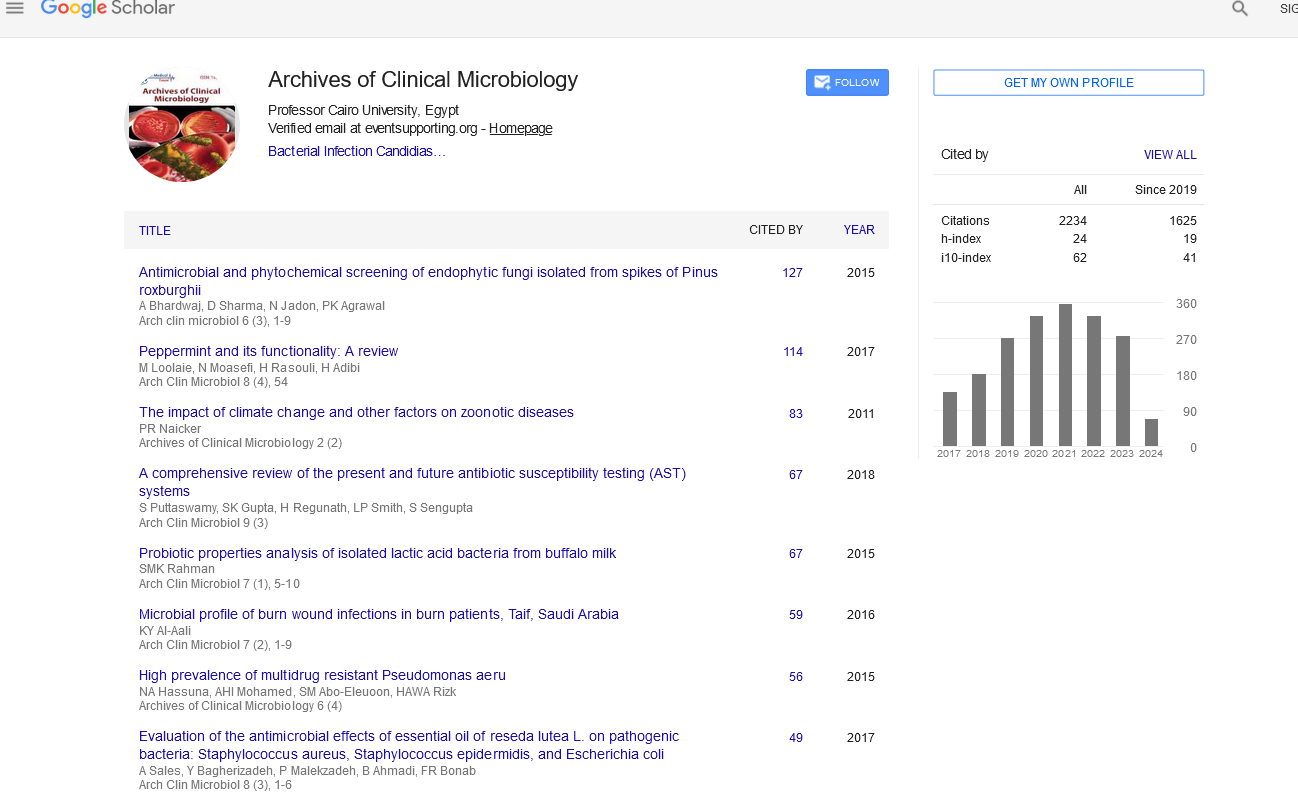Short Communication - (2024) Volume 15, Issue 6
Exploring the Frontiers of Microbial Genomics: Unravelling the Secrets of Microbial Diversity
Sara Ali Ahamad*
Department of Molecular Biology, University of Tehran, Azar St, Iran
*Correspondence:
Sara Ali Ahamad, Department of Molecular Biology, University of Tehran, Azar St,
Iran,
Email:
Received: 24-Jul-2023, Manuscript No. IPACM-23-13968;
Editor assigned: 27-Jul-2023, Pre QC No. IPACM-23-13968 (PQ);
Reviewed: 11-Aug-2023, QC No. IPACM-23-13968;
Revised: 17-Dec-2024, Manuscript No. IPACM-23-13968 (R);
Published:
24-Dec-2024
Abstract
Microbial genomics is a rapidly advancing field that explores
the genetic makeup and functions of microorganisms,
including bacteria, archaea, viruses and fungi. It encompasses
various approaches such as metagenomics, comparative
genomics and functional genomics to investigate the diversity,
evolution and interactions of microbes in different
environments. By deciphering the genetic information
encoded within microbial genomes, researchers gain insights
into the mechanisms underlying microbial adaptations, the
roles of specific genes in microbial physiology and the
functional potential of microbial communities. Microbial
genomics also plays a crucial role in understanding host
microbe interactions, such as the human microbiome, and
their implications for health and disease. This interdisciplinary
field offers new avenues for studying and harnessing the vast
genetic diversity present in microbial populations, leading to
advancements in biotechnology, medicine and environmental
science.
Microbial genomics is a rapidly advancing field that focuses
on the study of genomes and genetic diversity of
microorganisms. With the advent of high throughput
sequencing technologies, it has become possible to explore
the vast microbial world and gain insights into their
functional capabilities, evolutionary relationships, and
ecological roles. This review provides an overview of
microbial genomics, discussing the methodologies employed
in genome sequencing, assembly and annotation, as well as
the applications of microbial genomics in various fields such
as medicine, agriculture and environmental science. The use
of genomics in understanding microbial pathogenesis,
antibiotic resistance and microbial community dynamics is
highlighted. Furthermore, the role of comparative genomics
in elucidating the evolutionary history and genetic
adaptation of microorganisms is discussed. The challenges
and future directions of microbial genomics are also
presented, including the integration of multi-omics data and
the development of novel computational tools for data
analysis. Overall, microbial genomics has revolutionized our
understanding of the microbial world and holds great
promise for advancing human health, agriculture and
environmental sustainability.
Keywords
Microbial genomics; Microbial diversity;
Metagenomics; Comparative genomics; Functional genomics;
Microbial evolution; Microbial communities; Host microbe
interactions
Introduction
Microbial genomics is a rapidly evolving field that focuses on
the study of the genetic makeup and functioning of
microorganisms. These microscopic life forms, including bacteria,
archaea, fungi, viruses and other microbial communities, play
crucial roles in shaping our planet's ecosystems and influencing
human health. The advent of next generation sequencing
technologies and advances in bioinformatics has revolutionized
the study of microbial genomics, enabling researchers to delve
deeper into the hidden world of microorganisms and unravel their
secrets. In this article, we will explore the fascinating world of
microbial genomics, its applications and the impact it has on
various aspects of science and society [1].
The genomic revolution: The genomic revolution has been a
game changer in the field of microbiology. Traditional culture
based methods allowed scientists to study only a fraction of the
microbial world, as the majority of microorganisms are
unculturable in laboratory conditions [2]. However, with the
advent of high throughput sequencing technologies, scientists
can now bypass this limitation and directly sequence the DNA or
RNA of entire microbial communities, opening up new avenues
of exploration.
Metagenomics and metatranscriptomics: Metagenomics is a
powerful approach used in microbial genomics, enabling the
study of microbial communities directly from environmental
samples without the need for cultivation. By extracting DNA
from a sample and sequencing it, researchers can gain insights
into the diversity and functional potential of the microbial
community. Metatranscriptomics takes this a step further by
sequencing the RNA molecules, revealing the active genes and
metabolic pathways in a community.
Understanding microbial diversity: Microbial genomics has
unveiled the astonishing diversity of microorganisms present in various environments, including soil, oceans and human gut and
extreme habitats. Through large-scale sequencing efforts, such
as the Earth microbiome project and the human microbiome
project, researchers have discovered a vast array of previously
unknown microbial species. These discoveries have challenged
our understanding of life on Earth and emphasized the
significant roles microorganisms play in ecological processes.
Functional annotation and pathway analysis: Microbial
genomics not only helps identify the presence of different
microbial species but also provides insights into their functional
potential [3]. Through computational analysis, researchers can
predict the functions of genes and metabolic pathways,
shedding light on how microorganisms interact with their
environment and each other. This information is crucial in fields
such as biotechnology, agriculture and medicine, where
microbial enzymes and metabolic pathways are harnessed for
various applications.
Description
Biotechnological applications: Microbial genomics has
revolutionized biotechnology by enabling the discovery of novel
enzymes, natural products and bioactive compounds. By
studying the genetic blueprints of microorganisms, researchers
can identify genes responsible for the synthesis of valuable
products, such as antibiotics, enzymes and biofuels.
Furthermore, the field of synthetic biology utilizes microbial
genomics to engineer microorganisms for the production of high
value chemicals and pharmaceuticals.
Human microbiome and health: The human microbiome,
which consists of the trillions of microorganisms living in and on
our bodies, has emerged as a critical area of research in
microbial genomics. By studying the microbial communities in
the gut, skin, and other body sites, scientists have uncovered the
intricate relationship between the microbiome and human
health. Microbial genomics has provided insights into the role of
the microbiome in various diseases, including obesity,
inflammatory bowel disease and even mental health disorders.
Furthermore, personalized medicine approaches utilize
microbial genomics to develop targeted therapies based on an
individual's unique microbiome composition.
Environmental monitoring and bioremediation: Microbial
genomics has also found applications in environmental
monitoring and bioremediation. By studying the microbial
communities in polluted environments, researchers can identify
microorganisms capable of degrading pollutants, such as
hydrocarbons and heavy metals. This knowledge can be
harnessed to develop bioremediation strategies to clean up
contaminated sites and mitigate the impacts of pollution on
ecosystems.
Challenges and future directions: Despite the significant
advancements in microbial genomics, several challenges remain.
The vast amount of data generated from sequencing projects
requires robust computational tools and resources for analysis
and interpretation. Additionally, the functional annotation of
genes and metabolic pathways is still a daunting task, and our
understanding of the complex interactions within microbial communities is far from complete [4]. In the future, microbial
genomics will continue to evolve, driven by advancements in
sequencing technologies, bioinformatics and data analysis.
Integrating multi-omics approaches, such as metaproteomics
and metabolomics, will provide a more comprehensive
understanding of microbial systems. Furthermore, the
application of machine learning and artificial intelligence will
help uncover hidden patterns and accelerate discoveries in
microbial genomics.
Conclusion
Microbial genomics has revolutionized our understanding of
the microbial world, revealing its vast diversity, functional
potential, and impact on various aspects of science and society.
From biotechnology and medicine to environmental monitoring
and beyond, the applications of microbial genomics are vast and
ever-expanding. As we delve deeper into the secrets of microbial
genomes, we unlock new opportunities for innovation,
discovery, and the betterment of our planet and its inhabitants.
Microbial genomics has emerged as a powerful tool for exploring
the diverse and complex microbial world. Through the use of
high throughput sequencing technologies, researchers have
been able to unravel the genetic blueprints of microorganisms,
providing unprecedented insights into their biology, evolution
and ecological roles. The applications of microbial genomics are
vast and have far reaching implications in various fields. In the
field of medicine, microbial genomics has greatly contributed to
our understanding of microbial pathogenesis, antibiotic
resistance mechanisms, and the development of novel
therapeutic strategies. The ability to rapidly sequence and
analyze microbial genomes has facilitated the identification of
virulence factors, drug targets and diagnostic markers, enabling
more effective treatment and prevention of infectious diseases.
Looking ahead, the future of microbial genomics is promising.
Advances in sequencing technologies, such as long read
sequencing and single cell genomics, will enable more
comprehensive and accurate characterization of microbial
genomes. Integrative approaches that combine genomics with
metagenomics, transcriptomics and proteomics will provide a
more holistic understanding of microbial systems. Moreover, the
continued development of bioinformatics tools and machine
learning algorithms will enhance data analysis and facilitate the
discovery of novel biological insights.
Microbial genomics has revolutionized our understanding of
microorganisms and their impact on human health, agriculture
and the environment. By unraveling the genetic secrets of
microorganisms, we can harness their potential for the benefit
of society while also gaining crucial insights into the
fundamental principles of life. The ongoing advancements in
microbial genomics hold great promise for addressing global
challenges and shaping a sustainable future.
References
- Raoult D, Koonin EV (2012) Microbial genomics challenge darwin. Front Cell Infect Microbiol 2:127
[Crossref] [Google Scholar] [PubMed]
- San JE, Baichoo S, Kanzi A, Moosa Y, Lessells R, et al. (2020) Current affairs of microbial genome-wide association studies: Approaches, bottlenecks and analytical pitfalls. Front Microbiol 10:50260
[Crossref] [Google Scholar] [PubMed]
- Olson ND, Lund SP, Colman RE, Foster JT, Sahl JW, et al. (2015) Best practices for evaluating single nucleotide variant calling methods for microbial genomics. Front Genet 6:235
[Crossref] [Google Scholar] [PubMed]
- de la Haba RR, Antunes A, Hedlund BP (2022) Extremophiles: Microbial genomics and taxogenomics. Front Microbiol 13:984632
[Crossref] [Google Scholar] [PubMed]
Citation: Ahamad SA (2024) Exploring the Frontiers of Microbial Genomics: Unravelling the Secrets of Microbial Diversity. Arch Clinic Microbio Vol:
15 No:6





